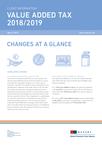
Value Added Tax 2018/2019
Legislative changes
Tax exemption: management of separate funds
As of the turn of the year 2017/2018, just one change to the German Value Added Tax Act will come into effect as a result of the German Investment Tax Reform Act, which was announced in July 2016. This relates to the tax exemption for the management of separate funds under Section 4 No. 8h UStG. This change merely entails a marginal expansion of the tax exemption which results from the ECJ’s ruling. There are also some textual follow-up changes due to the new version of the German Investment Tax Act. The management of undertakings for collective investment in transferable securities (UCITS) within the meaning of Section 1 (2) of the German Capital Investment Code (KAGB) and of analogous alternative investment funds (AIF) within the meaning of Section 1 (3) KAGB and pension schemes within the meaning of the German Insurance Supervision Act is thus tax-free.
Value added tax return: deadline for submission
The submission deadline for tax returns has been extended from 2018 within the scope of the German Act Modernising Taxation Procedure.
For a 2018 value added tax return, the submission deadline is 31 July 2019 or, pursuant to Section 149 (3) of the German Fiscal Code (AO), 28 February 2020 if this return is filed by a tax advisor.
As a rule, a 2017 value added tax return must be submitted by 31 May 2018. If a tax return is prepared by a tax advisor, this deadline will be extended until 31 December 2018.
Administrative rulings
Consignment stock
According to two rulings issued by the German Federal Fiscal Court (20 October 2016 – V R 31/15; 16 November 2016 – V R 1/16), the customer may have received a direct delivery even where the goods have been held in interim storage as consignment stock. In its notice of 10 October 2017, updated by notice of 12 December 2017 the fiscal authorities have put these rulings into effect and revised their implementing regulations accordingly. The new provisions will apply for all outstanding cases. However, the current rules may continue to be applied until 31 December 2018 (non-objection rule). However, this does not mean that a simplification rule has been introduced in principle.
Please note
- Particularly in case of cross-border deliveries, this change of perspective will affect the VAT situation (the obligation to register for value added tax may no longer apply).
- Within the scope of the major EU value added tax reform, the introduction of uniform EU rules for consignment stocks is envisaged from 1 January 2019.
Preliminary transactions for maritime shipping and aviation
The fiscal authorities have adopted the ruling of the ECJ (ruling of 4 May 2017 – C-33/16) to the effect that the tax exemption for services under Section 8 UStG which are directly provided to operators of sea-going vessels or international aviation companies (Section 4 No. 2 UStG) is also applicable to preliminary transactions in certain cases; cf. the German Finance Ministry’s notice of 6 October 2017. From January 1, 2018 on, the VAT exemption is mandatory.
Please note
All businesses should check whether their outgoing or incoming supplies are subject to this exemption rules otherwise, the tax administration might levy tax according to Sec. 14c VAT code or will deny the input VAT claim.
Tax group for value added tax purposes
Through their notice of 26 May 2017, the fiscal authorities responded to the question of when partnerships can also be tax groups. This was previously not permitted under German tax law, since Section 2 (2) No. 2 UStG merely refers to “legal persons”.
Since the ECJ has decided that, contrary to its clear wording, this law must be interpreted to the effect that partnerships can also be tax groups in certain circumstances, in addition to the German Federal Fiscal Court the fiscal authorities are now following this ruling.
A tax group for VAT purposes is mandatorily applicable subject to fulfilment of the relevant preconditions. There is no option in this respect.
Please note
Groups whose subsidiaries have the legal form of a partnership should now examine whether new or revised tax groups will result due to this revised legal opinion. This will not be desirable in all cases. On the other hand, if a tax group is desired some organisational adjustments may be necessary. Companies only have until the end of 2018 for this, since the principles laid down in the German Finance Ministry’s notice of 26 May 2017 mandatorily apply for transactions in the period after 31 December 2018.
Voluntary work
Another transitional period which expires at the end of 2018 relates to the tax exemption for voluntary work (Section 4 No. 26 UStG). Through the German Finance Ministry’s notice of 8 June 2017, the fiscal authorities have concretised the preconditions for tax exemption while once again referring to relevant rulings of the German Federal Fiscal Court.
Voluntary work is thus work which is expressly designated as such in another law (i.e. not the German Value Added Tax Act), which is generally characterised as voluntary in common parlance or which is covered by the substantive concept of volunteering.
Please note
Even if one of these preconditions is fulfilled, in certain cases a tax exemption may nonetheless not be granted, e.g. if this voluntary work is so extensive that a professional activity cannot be ruled out. For example, this relates to members of the management and supervisory boards of savings bank associations. For these persons, while the voluntary nature of their work is defined in corporate articles (under public law), this is not defined by law. However, up to the end of 2018 they can benefit from a transitional rule stipulated in the above-mentioned notice of the German Finance Ministry and treat their relevant transactions as tax free.
Court rulings
Retrospective correction of invoices
Since 2016, rulings of the German Federal Fiscal Court and the EJC have considered the issue of the retrospective correction of invoices. While the German Federal Fiscal Court recognised the possibility of retrospective corrections to invoices through its ruling of 20 October 2016 (V R 26/15), the German Finance Ministry has yet to issue a notice bringing to an end the opposite administrative practice which remains in place.
The possibility of a retrospective invoice correction means that input VAT deduction can be legitimated in the year of the original (incorrect) invoice. This avoids high (6% p. a.) interest on arrears.
Tax exemption for tuition services
Through its ruling of 16 March 2017 (V R 38/16), the German Federal Fiscal Court has referred to the ECJ a series of questions concerning tax exemption for tuition services. While the case considered by the Federal Fiscal Court related to driving lessons for learners preparing for their test at a driving school, these issues will likely also affect other types of tuition services.
Please note
Companies which may be affected by the case C-449/17 and for which this value added tax exemption is an advantage should apply for a tax exemption for any periods which are not yet barred by lapse of time, but they should continue to register and pay over value added tax.
Correction of value added tax
Section 17 (2) No. 1 UStG requires a correction of value added tax in the event that the remuneration cannot be collected. In 2014, the German Federal Fiscal Court responded to the question of whether this also applies in cases where remuneration is unobtainable for an extended period of time (VR 31/12). The Federal Fiscal Court maintained that pre-financing over a period of several years violated the principle of equality. It remains unclear whether this ruling is also applicable in other cases where remuneration is only obtained over an extended period of time (hire-purchase).
In another case, the Federal Fiscal Court expressed doubts as to whether immediate imputed taxation in case of the simultaneous transfer of taxed commission to a professional football players’ agent over a period of several years is in keeping with Union law. This issue was thus referred to the ECJ for a response.
Also of interest in this context are two further cases before the ECJ – C-660/16 (Kollross) and C-661/16 (Wirtl) – which are concerned with the correction of value added tax for a down payment, where the service for which this down payment was made has not been provided. Among other issues, it is uncertain here whether a correction is dependent on the reimbursement of the down payment.
Invoices with a PO box address
In its ruling of 6 April 2016 (V R 25/15), the Federal Fiscal Court referred to the ECJ various issues relating to the address which a company providing a service indicates in its invoice. To date, the Federal Fiscal Court has held that simple PO box addresses are not sufficient, since economic activities must be performed at this address. However, in the opinion of the German authorities (Section 14.5 (2) of the implementing rules for value added tax), for the recipient of the service at any rate it is sufficient to indicate PO box or major customer addresses.
Please note
In its decision of 15 November 2017 (joint cases C-374/16, C-375/16), the ECJ has now decided that the service recipient’s input VAT deduction may not be made dependent on whether the invoice issuer provides in its invoice an address at which it performs economic activities.
From the EU
Vouchers: VAT treatment
The Vouchers Directive (Directive (EU) 2016/1065) was published in mid-2016. National legislatures are obliged to transpose this directive by 31 December 2018. Since the treatment of vouchers has not yet been provided for in either national or EU law, under the Vouchers Directive a distinction will now apply between single-purpose vouchers and multi-purpose vouchers.
Single-purpose vouchers are vouchers for which the place of delivery of the items or the place of the service and the applicable VAT on the service or items designated in the voucher are already known at the time of these vouchers’ issue. Tax is levied on these single-purpose vouchers as of the issue of the voucher, since the necessary information is already available. The subsequent redemption of the voucher will not therefore trigger any further tax levy.
Multi-purpose vouchers are vouchers which are not single- purpose vouchers. In the case of multi-purpose vouchers, as of their handover it is not yet known which service will be provided, and precisely when. Accordingly, tax will only be levied when this voucher is redeemed. On the other hand, the prior handover of this multi-purpose voucher is not taxable.




